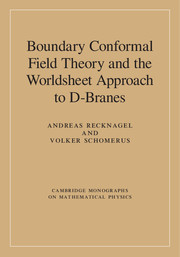Book contents
- Frontmatter
- Dedication
- Contents
- Introduction
- 1 Free field theory with boundaries
- 2 Superstrings and branes
- 3 Conformal field theory on the plane
- 4 Boundary conformal field theory
- 5 Perturbations of boundary conformal field theories
- 6 The Wess–Zumino–Witten model on SU(2)
- 7 Gepner model boundary states and Calabi–Yau branes
- Appendix
- References
- Index
Introduction
Published online by Cambridge University Press: 05 November 2013
- Frontmatter
- Dedication
- Contents
- Introduction
- 1 Free field theory with boundaries
- 2 Superstrings and branes
- 3 Conformal field theory on the plane
- 4 Boundary conformal field theory
- 5 Perturbations of boundary conformal field theories
- 6 The Wess–Zumino–Witten model on SU(2)
- 7 Gepner model boundary states and Calabi–Yau branes
- Appendix
- References
- Index
Summary
The aim of this book is to give an introduction to two-dimensional boundary conformal field theory (CFT) and an overview of its various applications to D-branes in string theory.
The study of two-dimensional scale invariant quantum field theories (QFTs) has a long history. Applications to important problems in various branches of physics are so numerous that CFT has established its position as one of the leading techniques in modern theoretical physics. Its first significant success was the exact computation of critical exponents for second-order phase transitions in two-dimensional statistical systems, such as the critical Ising model and many extensions thereof. Surface critical phenomena are still among the key applications, but many less obvious ones have joined.
The applications most relevant for us are those in string theory. To this date, string theory clearly offers the most promising candidate for a fundamental theory of quantum gravity and an intriguing approach to the unification of all four known interactions. Strings may be considered as one-dimensional quantum systems or, equivalently, two-dimensional statistical systems. Among all such systems, CFTs are singled out since they solve the string theoretic equations of motion.
Let us also mention that two-dimensional CFTs offer a very fruitful laboratory for QFT. Many models of CFT can be solved non-perturbatively, mostly aided by their infinite-dimensional symmetries. This offers unique insights into the very nature of QFT, the importance of non-perturbative effects and dualities between theories with seemingly different field content.
- Type
- Chapter
- Information
- Publisher: Cambridge University PressPrint publication year: 2013

